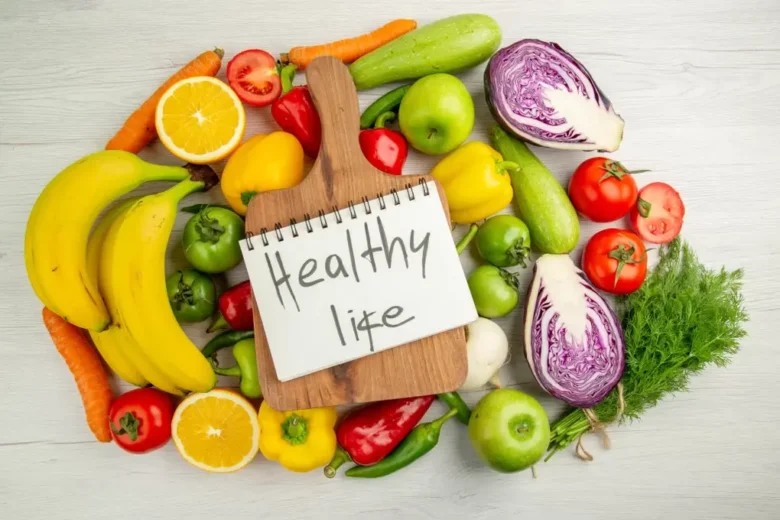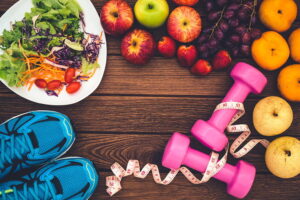An active lifestyle is one of the healthiest choices, but it’s only half the equation. The other half, fueling your body with energy to recover after exercise, is even more complex. Understanding the relationship between food and energy is essential for maintaining a balanced diet for an active lifestyle. Listening to your body and providing it with high-quality nutrition so it can function properly, adapt to its environment, and thrive is a dynamic process. Aligning diet and training goals can improve energy, performance, recovery, and endurance. This article goes beyond meal plans and explains how you can use nutrition to support and enhance your active lifestyle, transforming food from an uncertain source into your best ally.
View Food as Functional Fuel, Not Just Calories:
Stop thinking of food as calories and start thinking of it as fuel to maintain an active lifestyle. Every time you eat, you’re choosing the quality of your body’s energy. Think of your body like a sports car: you wouldn’t fill it with low-quality fuel and expect it to perform well. Consuming processed foods, refined carbohydrates, and harmful fats leads to inflammation, delayed healing, and poor performance. Instead, choose nutrient-rich, unprocessed foods, such as lean protein (for muscle repair), complex carbohydrates (for energy), healthy fats (for joint health and hormone synthesis), and a variety of fruits and vegetables (for vitamins and antioxidants). This perspective transforms mealtime from a source of embarrassment into an opportunity to carefully nourish your body and meet its needs.
Understand Nutrition Timing:
Mealtime can significantly impact your energy and recovery, especially during exercise. Nutrition timing doesn’t have to be military-like, but a general framework can be helpful. To gain energy, eat a balanced lunch with carbohydrates and protein 2-3 hours before activity. Eating a simple, easily digestible snack, such as a banana or smoothie, 30–60 minutes before exercise can provide an energy boost. Consuming protein and carbohydrates within 45-60 minutes after exercise replenishes glycogen and stimulates muscle regeneration. Eating chicken breast with sweet potatoes or a protein smoothie with fruit after exercise signals your body to repair and rebuild.
Prioritize Protein for Muscle Recovery and Satiety:
Protein is essential for active people. It not only helps build muscle but also repairs small muscle tissues damaged during exercise, making you stronger. Daily protein intake aids in muscle repair, reduces muscle breakdown, and builds muscle mass, boosting your metabolism. The high satiety provided by protein can reduce overeating and maintain good weight management by prolonging the feeling of fullness. Add high-quality proteins, such as Greek yogurt, eggs, fish, lentils, or tofu, to every meal and snack to maintain a consistent protein intake. This constant supply of protein ensures your body receives the amino acids it needs for recovery and healing throughout the day.
Using Carbohydrates for Energy:
Many popular diets wrongly demonize carbohydrates, but active people need them for energy. The glucose in carbohydrates is stored as glycogen in the muscles and liver. Glycogen is your main energy source during moderate to intense exercise. When glycogen levels are low, you feel exhausted, tired, and dizzy, and have less energy. Choosing the right carbohydrates is crucial. Complex carbohydrates, such as healthy grains (oats, quinoa, and brown rice), starchy vegetables (sweet potatoes and squash), and beans, provide a slow and steady energy release. During exercise, when your body needs the most energy or glycogen, it’s best to choose simpler, more quickly digestible carbohydrates like white rice, bananas, and whole-wheat bread.
Rely on Healthy Fats for Long-Lasting Energy:
Fat is another important macronutrient for an active lifestyle. Fat provides energy for long-term, low-intensity activities, while carbohydrates fuel intense exercise. These vitamins aid in the absorption of fat-soluble vitamins A, D, E, and K, which are essential for healthy bones and a healthy immune system. Healthy fats help lubricate joints, reduce inflammation, and secrete hormones, including those that regulate metabolism. Fatty fish like salmon and mackerel, avocados, almonds, seeds, olive oil, and unsaturated fats should be a regular part of your diet. Balance is key: too little fat can lead to hormonal imbalances, lethargy, and poor recovery, while too much saturated and trans fat can cause inflammation.
Hydration Is Crucial for Athletic Performance:
Water is the most important, yet often overlooked, nutrient during exercise. Even mild dehydration (a loss of 2% body water) can negatively impact performance, leading to fatigue, decreased motivation to exercise, and the feeling of being overexerted. Water regulates body temperature, lubricates joints, and transports nutrients to cells. Hydration isn’t just about drinking during exercise; it’s a continuous process. Drink water in the morning and throughout the day. Try to keep your urine a light yellow. If you exercise for longer than 60 minutes or in hot weather, replace sodium and other minerals lost through sweat with electrolyte-rich drinks to prevent cramping and maintain fluid balance.
Listen to Your Body’s Unique Signals for True Bio-Individuality:
These concepts provide a solid foundation, but listening to your body is paramount. No single nutrition plan works for everyone. Bio-individuality means that one person’s ideal diet isn’t necessarily right for another. Consider how different foods affect you during and after a workout. Do certain foods make you feel heavy and sluggish? Do you alternate periods of energy with periods of lightness? Do you need extra carbohydrates on intense training days? A food and mood journal can help you discover patterns. Nutritional knowledge and intuitive eating allow you to tailor your diet to your activity level, metabolism, and preferences, leading to sustainable and beneficial eating habits.
Conclusion:
Nutrition for an active lifestyle is an ongoing personal journey. Developing a joyful and strategic relationship with food can help you make every meal improve your health and fuel your passion. By viewing food as functional fuel, understanding macronutrients, and emphasizing the crucial importance of hydration, you can provide your body with the resources it needs to function and rejuvenate. Always remember that adhering to these concepts is more important than striving for perfection. Give yourself space to learn and adapt, and prioritize your body’s instructions. Focused activity and focused eating create a powerful, energetic feedback loop that supports fitness goals and lifelong health, energy, and resilience. Get the most out of your plate during this exciting adventure.
FAQs:
1. Should I eat before my morning workout?
We recommend eating a short, easily digestible meal (30–60 minutes) before a morning workout to break the overnight fast and provide energy. Bananas, small smoothies, and toast with nut butter are excellent options. If you’re comfortable exercising on an empty stomach (especially with light exertion), you can eat a healthy meal afterward.
2. Do I need a sports drink to stay hydrated?
For most moderate-intensity athletes exercising for less than 60 minutes, drinking water is sufficient. Sports drinks can replace electrolytes (such as salt and potassium) lost through sweat and provide carbohydrates to maintain energy during prolonged, intense exercise (60-90 minutes) or in hot and humid environments.
3. How much protein do I need?
Protein needs depend on age, activity level, and goals. For active individuals, the recommended protein intake is 1.2 to 2.0 grams per kilogram (kg). For example, a person weighing 68 kg (150 lb) should consume 82 to 136 grams of protein daily. Splitting this protein over several meals is more effective than consuming it all at once.
4. What is a suitable post-workout meal if I don’t have an appetite?
Appetite often decreases immediately after intense exercise. A light, digestible liquid meal is recommended. Protein shakes or smoothies, which combine protein powder, fruit, and milk or milk substitutes, provide nutrients in an easily digestible, liquid form.
5. Should supplements complement an active lifestyle?
Supplements should never replace a healthy diet. Whole foods should form the foundation of your diet. Some people may benefit from certain supplements. Vitamin D deficiency is common in people who get little sunlight. A high-quality protein powder can help increase protein intake. Consult a doctor before starting a new supplement program.




